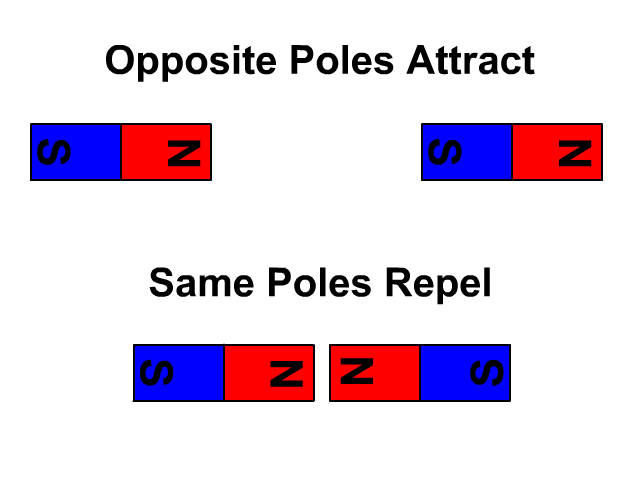September 24, 2023 Church Service
Love of God; Fear of God
Throughout the Bible we come across the expression fear of the Lord. It no doubt refers to a complex aspect of life and is far from simple. For a few thoughts on it, see “Who Do You Fear?”. Clearly, it is meant to play a significant role in life. If not, why does it appear so often? Alongside this “fear of the Lord,” another prominent idea emerges throughout Scripture: love for God. How do fear and love of God relate?
A bar magnet
Maybe the fear of the Lord and love of the Lord work kind of like this.
Envision a bar magnet.

As you know, a magnet has two distinct magnetic poles: the north pole and the south pole. As any kid can tell you, opposite poles attract and like poles repel.

So far, so good. Magnets attract and repel.
As you certainly know, this is why traditional compasses work. The magnetized needle interacts with the magnetic field of the earth, attracted by one pole and repulsed by the other, making it move.
The Love and Fear Magnet
Now let’s take this magnet and put love of God on the north end and fear of the Lord on the southern end.

To complete the image, we need to add one more piece to our metaphor: a compass. Look at this video and pay attention to how the magnet interacts with the compass.
There is a push-pull interaction of the magnet with the different ends of the compass (anyone who is into physics could go more deeply into the way the different magnetic fields interact, but we can ignore that for our sake). Either end of the magnet works to push the compass in the direction you want it to go.
You life should be like that compass needle. The love of God should keep us pointing in the right way. It connects us to the vital life of God and draws us ever towards him and the blessings he has. The fear of the Lord serves the same point: keeping us in connection with God. But it does so in almost the opposite way. The fear of the Lord is a force that repulses us from wickedness, sin, disobedience and disregard for God the creator and Redeemer.
Both love and fear of God need to move the needle of your life.
September 17, 2023 Church Service
September 10, 2023 Church Service
Passport Kids – This Sunday!

Where is your stock?
I’m no expert in investments and the stock market, but I know the general pattern. You buy stocks or bonds in some form or another and hope they go up in value. When they go up, you sell and voila, you make money. That’s the usual way things are done. But it’s also possible to bet against the market. In this case, your profits come from betting that certain companies are going to fall in value. If you take this approach, then you hope to hear the news of failure, disruption, and collapse. These patterns within the stock market capture the relationship of holiness to the world. Yes, that’s right. Holiness is a little like buying stock. To see it play out, consider with me Revelation 18—19.
Where your stocks are determines what you rejoice over
Revelation 18—19 is close to the end. We’re at the climactic showdown. The fall of Babylon dominates chapter 18. Now, Babylon in the book of Revelation is many things at many different levels. As Revelation unfolds, though, it becomes clear that Babylon is the anti-kingdom. As one author puts it:
“In his portrayal of Babylon the great, John is again confronting his audience with the choice between the beast or the lamb, the world or the church, those who dwell on the earth or those who are citizens of heaven, because Babylon is the “anti-Kingdom”—the alluring, all-encompassing alternative to the Kingdom of God.”
Menn, Biblical Eschatology, 2nd Ed., 294
Stockholders in Babylon
In the vision of chapter 18, we witness this anti-kingdom fall in judgment. Better said, we hear about the fact that it has fallen and we witness the way people respond to it.
Mourning.
The powerful and important people of the earth mourn (18:9-10). The businesspeople, the merchants, the traders, the Wall Street brokers mourn (18:11-17). The truck drivers, cargo ship captains, and freight train companies mourn (18:15-18).
Why is everyone so sad? Because they were vested in the existence and success of Babylon. They put all their savings into Babylon stock, as it were. They saw how wonderful, shiny, and great it was and poured all their money into it. They bet everything that it would endlessly increase in value. Instead, it turned out to be just like a crypto-currency exchange. The bottom dropped out on them and they are left with nothing.
Having lost their fortune is hard enough. But the coming return of Jesus in judgment makes it all the worse because everyone is about to be judged for what they have done (20:11-15—notice the repetitive emphasis on judging people based on their works). To use the picture from Jesus’ parable, it’s like Jesus will sit on the throne and ask each person to show their investment portfolio and judge them based on its value (see Matthew 25:14—30).
Stockholders in the Kingdom of God
Contrast the way the stockholders of Babylon mourn with the wild rejoicing that breaks out in heaven when Babylon goes into its death spiral. A great multitude cries out in worship, with the worship leaders shouting out, “Praise God” (19:1-5).
This is a stunning reversal in the plot of Revelation. Up ‘til this point, those who side with God and his Kingdom have mostly been getting trampled on. These people of God invested stock in the Kingdom of God and they bet all they had that Babylon would go belly up…but it looked like it would just keep growing in glory and splendor forever. It looked like holiness wasn’t going to pay out anything of great value. Until the turn.
Financial Advisors, in my experience, have one main component to their job. While they are specialists in the technical knowledge about how our financial system works—in all of its ridiculous complexity—even more importantly, they exist to tell you one message over and over again: it is worth it to play the long game with your finances. Don’t bet on what looks flashy and impressive now, bet on things that will hold value over the long haul.
And chapter 18—19 of Revelation show the tipping point where investments in holiness go from looking pretty silly to being the obvious best choice for the long run.
While Revelation has a cataclysmic, end-of-all-things aspect to its meaning and function, it also lays out for us the pattern of life until Jesus returns to close out this age and bring in fully the age to come. Babylon stands partially for a symbol of the world, people now, and how they stand in opposition to turning to God in worship. And, just like in Revelation, Babylon often looks pretty convincing and goes to great effort to make signing up for the Kingdom of God look like a fool’s errand.
As we work through 1 Peter, we see the conflict between Babylon and the Kingdom of God come into sharp focus. The people were suffering a fiery ordeal (1 Peter 4:12) of suffering, social ostracization, and persecution of various soft and hard types. An easy out? Stop living holy lives. That is, stop living lives devoted to knowing God and transforming themselves into the image of Jesus in word and deed.
But Peter steps in to remind them: become holy in your total way of life, because God is holy (1 Peter 1:14-16).
Why? Lots of reasons. One of note: the stock with actual value is that which God holds, not Babylon (1 Peter 1:3-9)
Where is your stock?
Holiness is a bit like the stock market. Holiness is like investing your stock in the Kingdom of God and living for Jesus in all things. And holding out in trust and hope that, in the end, it will pay out. The other pathway is to invest in Babylon. It looks shiny and exciting, but no matter how hard it tries, it can never quite shake the “too good to be true” veneer. Whatever you invest there will burn up in Babylon’s death spiral.
On a practical point, this swing of events in chapters 18—19 of Revelation subtly but forcibly asks: are you in position to rejoice with the just judgment of God over Babylon, or am I more apt to mourn? It challenges you, the reader: are you able to rejoice in the defeat of the enemy of God, or do you have so much stock in it that it will be escaping as through a fire?
September 3, 2023 Church Service
The weight of papers past
Some people are good at throwing things away. I’m not (though I’ve gotten much better with practice). You never know when something will be useful. Anyway, I was heading into a master’s degree before I finally managed to throw out my middle school papers, work, and notes that I had kept. There is just so much precious in them—at least, deeply precious to me. They speak to a past, a pattern of growth, work, and effort. They were precious. At least, precious in the sense of I would rather keep them around in a drawer in the dresser at my parent’s house that I didn’t live in and, even whilst visiting, hardly ever looked into. But keeping them there rather than throwing them away was important.
Which is one of the funny things about our pasts. They are dear to us, but often, the weight of the past is a lot like clutter which hampers life in the now.
In successive bouts of de-cluttering throughout the years, I have succeeded in throwing away (or recycling 😊) all of my former middle school, high school, undergraduate, as well as graduate school materials and assignments, except for a carefully curated few.
What ultimately got me around to throwing away/recycling? The past weighed too much.
The weight of the past
Papers are heavy
First, quite literally the past was too heavy to keep carrying around each time we moved. When you have to carry each and every box of papers from the past downstairs, into a truck, out of the truck, and upstairs into a new house, the weight of the past becomes far less precious.
Identities are heavier
Second, and more metaphorically, I found over time that holding on to so much of the past can be a burdensome weight in understanding who I am and what I am trying to be in the present. It has been fun to periodically poke about in my middle school essays, review my chemistry notes from high school, or look at water resources engineering problems from college. But these all bear very little connection to my life now. They are testimonies of what I once could do well, but no longer remember much about and no longer have any need to do. Holding on to them was holding on to an idea of who I am and what I should be able to do that is no longer true or necessary.
Yes, I once could do advanced mathematics and all kinds of cool stuff in chemistry. But outside of a brief stint in tutoring math and a few lucky times in substitute teaching, I haven’t done any of that stuff in more than a decade. Maybe this is just me, but I’ve found that holding on to these testaments of past ability puts a pressure on my life to still be able to do what I used to.
So, over the years I have progressively pruned, with increasing ruthlessness, my stash of precious papers from the past. Now the stacks and piles are a mere couple folders.
Next thoughts
I’m sure you can tell a similar story with your own possessions. The experience of pruning things from the past is a helpful analogy to talking about change at church as we think through our current Church Health Assessment. In working through my precious papers which tied me to the past, there are three important principles I’ve come to appreciate about how I need to relate to the past: (1) honor the past, (2) live in the present, and (3) face the future.
Coming shortly, we’ll think a little together about how these principles relate to various ways the church relates to the past. As we process, discuss, and debate aspects of our recent Church Health Assessment, we will certainly need wisdom to figure out what in our past should remain our present, how we can honor the past, how we can face the future, and how we can do all these things without being weighed down.
Lord, help us.


